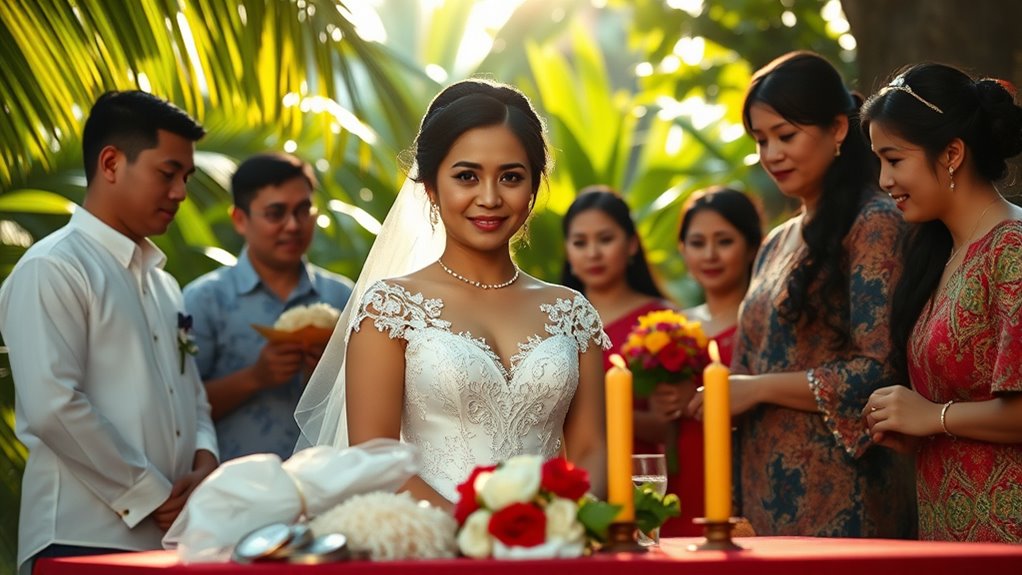Filipino wedding superstitions play a significant role in shaping your special day. You need to be aware of beliefs like sukob, which warns against siblings marrying in the same year to avoid bad luck. Traditional symbols like the arrhae and the cord and veil enhance the ceremony’s meaning. You’ll also want to reflect on practical gift choices, as some items are linked to misfortune. Weather omens can influence your wedding vibe too. There’s so much more to explore!
Key Takeaways
- The Sukob superstition advises against siblings marrying in the same year to prevent bad luck, a belief rooted in folklore and religion.
- Couples often seek parental blessings to ensure harmony and safeguard against misfortunes during their marriage.
- Avoid giving sharp objects like knives or scissors as gifts, as they symbolize a broken marriage in Filipino culture.
- Favorable wedding dates and colors are chosen based on local folklore to enhance the auspiciousness of the ceremony.
- Weather conditions like rain may be interpreted as bad luck or good fortune, affecting the couple’s emotions on their wedding day.
The Significance of Groom’s Arrival
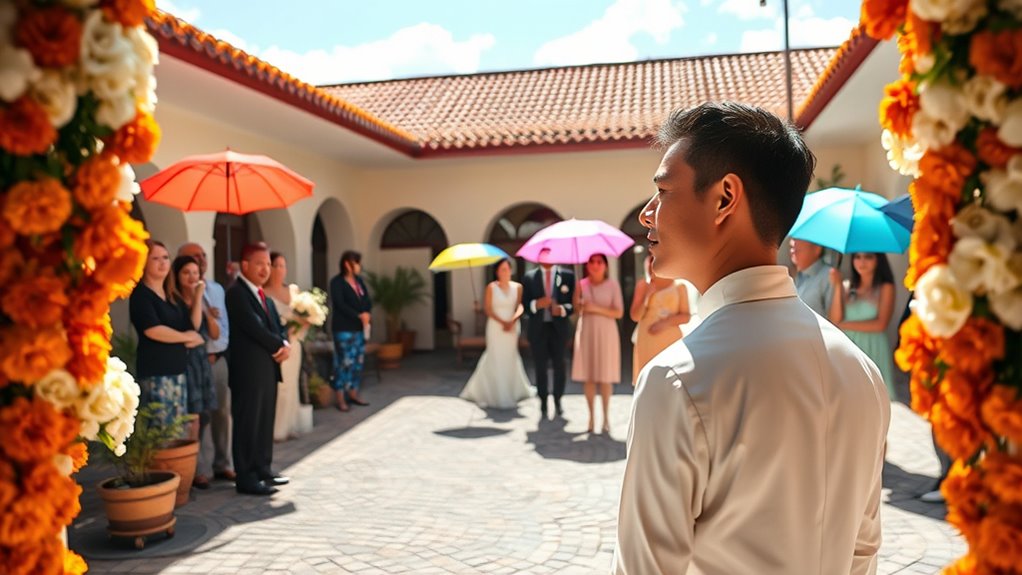
The arrival of the groom is a pivotal moment in Filipino weddings, steeped in cultural significance and tradition. You’ll notice that this event marks the beginning of a respectful union between two families.
During the pamamanhikan, the groom’s family visits the bride’s family to formally ask for her hand in marriage. This gesture emphasizes respect and commitment, as the groom often performs household tasks to honor the bride’s family. Sukob is a superstition that underscores the importance of timing in marriage, as it is believed to bring bad luck if two siblings marry within the same year.
Typically dressed in a Barong Tagalog, he symbolizes pride in Filipino heritage. Both families gather to discuss important wedding details, ensuring everyone’s involvement.
This meeting not only solidifies the couple’s bond but also strengthens family ties, preserving cultural heritage and values throughout the wedding planning process.
Understanding Sukob Superstition
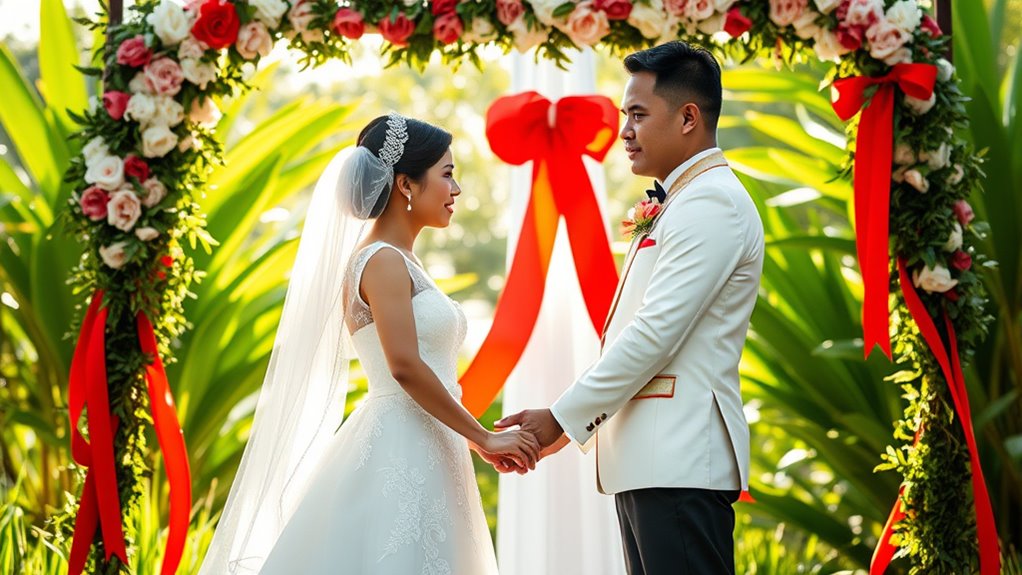
Understanding Sukob superstition is essential if you want to navigate the complexities of Filipino wedding traditions. Sukob refers to the belief that if two siblings marry in the same year, it invites bad luck, which can lead to accidents or tragedies. This superstition, rooted in Filipino culture and influenced by indigenous folklore and Catholicism, emphasizes family and tradition. Many couples take precautions to avoid Sukob by choosing wedding dates in different years or even planning double weddings. The belief’s strictness can vary across regions, but its impact on wedding planning remains significant. As a result, many couples also seek parental blessings to ensure a harmonious union and safeguard against misfortunes associated with this superstition.
Symbolic Offerings for a Blessed Wedding
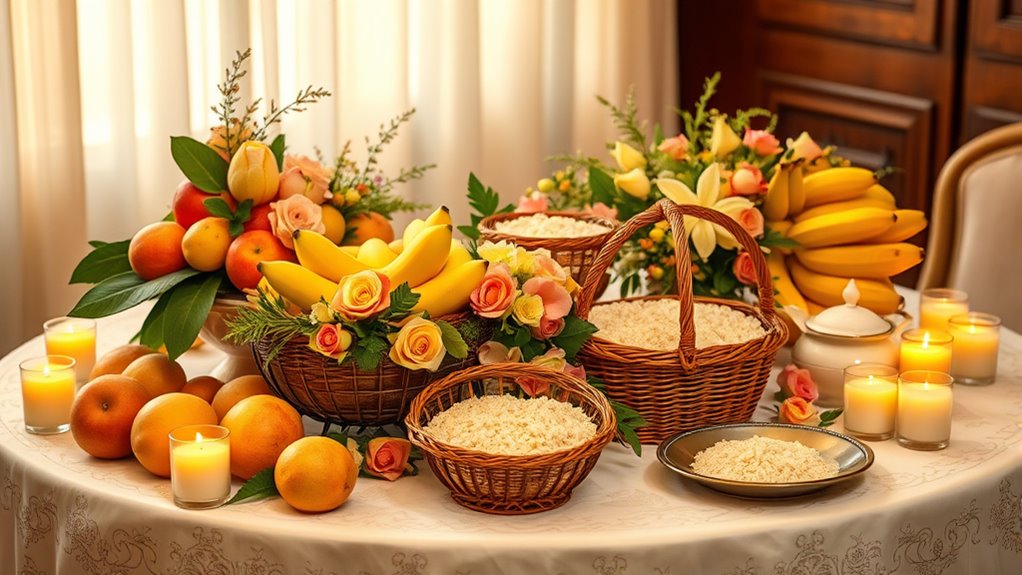
Steering through Filipino wedding traditions often leads you to symbolic offerings that bless the union. The arrhae, or 13 coins, showcases the groom’s commitment to provide for his wife and future family.
Wedding candles, lit by sponsors, symbolize God’s presence within the marriage. The cord and veil represent unity, physically connecting the couple during the ceremony.
Incorporating the sampaguita, the national flower, embodies fidelity and devotion. Each role, from coin bearers to ring bearers, plays a crucial part in these rituals, reinforcing spiritual and financial unity.
Superstitions Surrounding Wedding Gifts
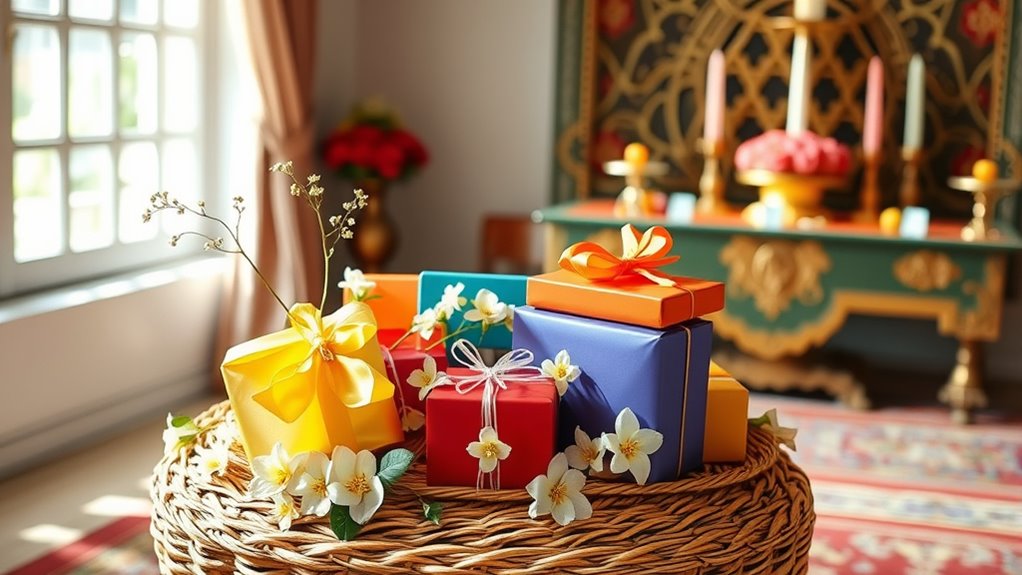
When planning a wedding in the Philippines, you’ll find that the gifts exchanged carry significant meaning and are often influenced by deep-rooted superstitions.
Sharp objects, like knives or scissors, are generally avoided, as they symbolize a broken marriage. Instead, practical gifts like kitchen appliances or linens are favored, while cash contributions help the couple start their new life.
Traditional items, such as culturally significant clothing or family heirlooms, are cherished. It’s essential to choose gifts thoughtfully, as certain items like mirrors or anything black can bring bad luck.
Weather Omens on Your Wedding Day
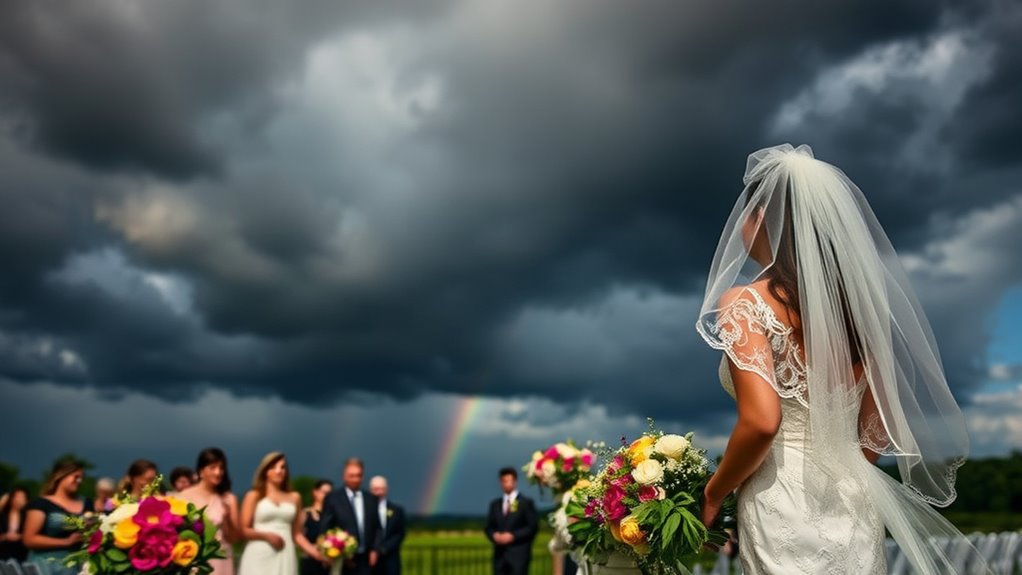
As you prepare for your wedding day, the weather can evoke a mix of emotions and beliefs, shaping how you perceive the significance of the day.
Rain might symbolize a tearful marriage for some, while others view it as a sign of good luck and prosperity. Clear skies are generally seen as auspicious, suggesting a bright future ahead.
Wind or strong gusts can feel unsettling but aren’t commonly discussed. Thunderstorms or heavy rain may pose challenges for outdoor ceremonies, though they aren’t universally unlucky.
A light drizzle can still bring positive connotations, depending on local beliefs. Embracing these weather omens can add depth to your celebration, reflecting both your hopes and cultural heritage.
The Role of Candles in Wedding Ceremonies
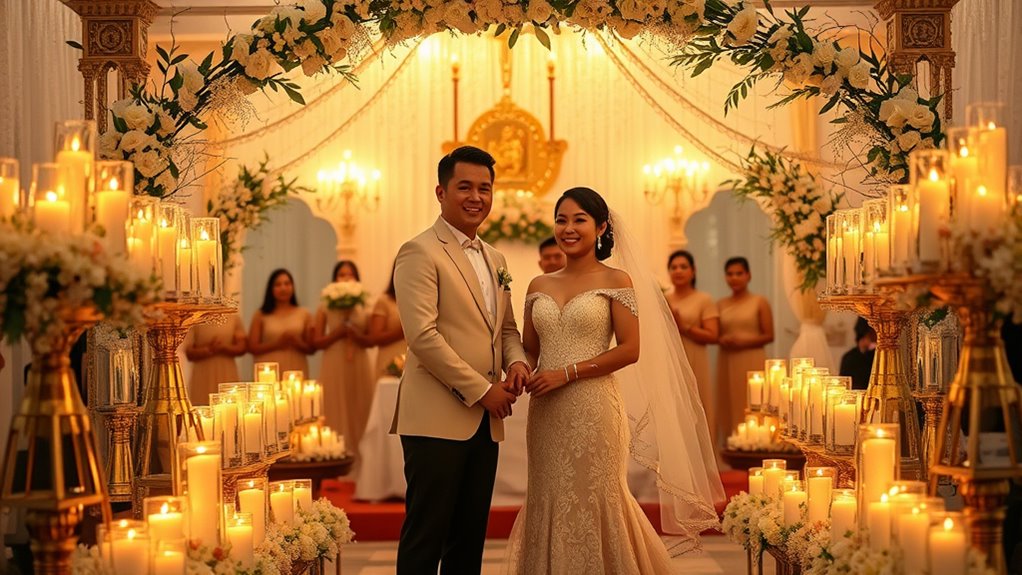
Candles play an essential role in Filipino wedding ceremonies, symbolizing unity and divine light in the couple’s journey together.
Usually lit by the *ninong* and *ninang*, two candles are placed on either side of the couple, who then light a unity candle. This act represents their commitment, involving both them and God in their union.
The unity candle signifies the merging of two families and souls, guiding them through life’s challenges. After lighting the unity candle, the individual candles are blown out, marking the start of their new life together.
The unity candle symbolizes the joining of families and souls, illuminating the couple’s journey as they begin their new life together.
This ritual emphasizes the significance of faith and family, ensuring that the couple’s journey is illuminated by love and spiritual support.
Releasing Doves for Good Fortune
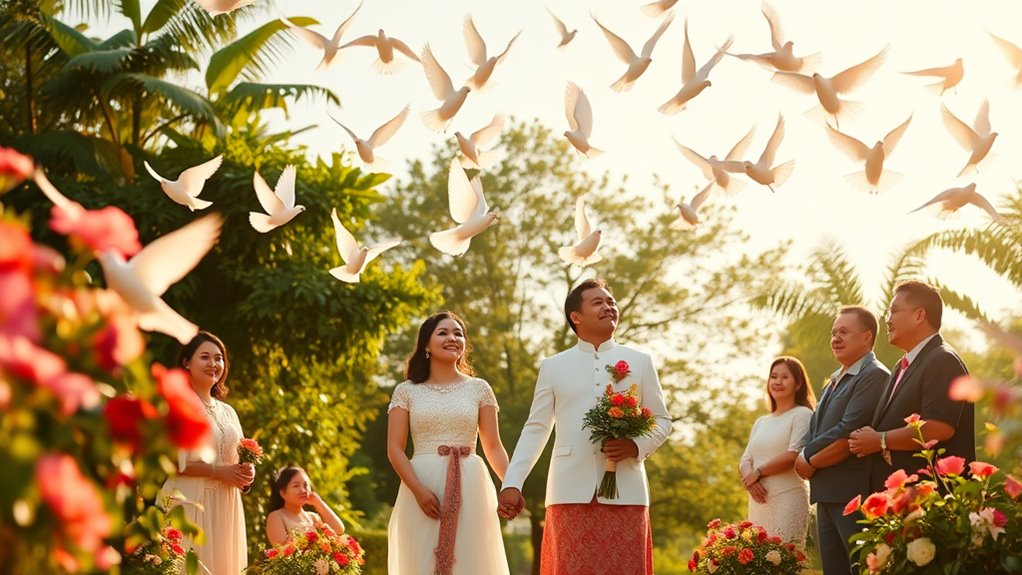
Releasing doves at Filipino weddings isn’t just a beautiful spectacle; it embodies a deep-seated wish for harmony and love in the couple’s life together. Doves symbolize peace, unity, and fidelity, making them a fitting representation of marriage.
When you release doves, you’re not just celebrating visually; you’re invoking blessings for your relationship. This act often involves family and friends, spreading joy and reinforcing community bonds.
As the doves take flight, they symbolize your commitment to each other and a hopeful future. If they soar gracefully together, it’s seen as a sign of good fortune ahead.
Ultimately, this cherished tradition deepens the emotional connection of your special day, creating lasting memories for everyone involved.
Timing and Its Importance in Filipino Culture
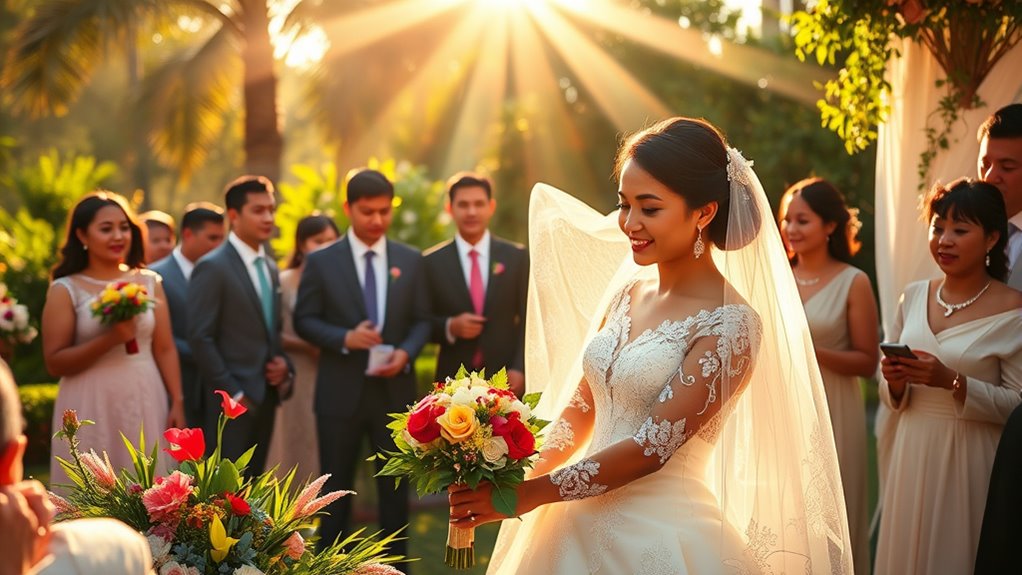
Timing plays an essential role in Filipino weddings, steeped in traditions that reflect cultural beliefs and values.
It’s vital to avoid siblings marrying in the same year, as it may split good fortune and attract bad luck. Many couples plan their wedding dates well in advance to avoid superstitions. For instance, marrying within the same year as a family member’s death is deemed unlucky.
On the wedding day, the groom typically arrives first to guarantee a smooth ceremony. Morning or afternoon weddings are preferred, respecting tradition and accommodating family schedules.
This careful consideration of timing emphasizes the importance of family and cultural customs in creating a harmonious celebration.
Traditional Rituals for a Successful Marriage
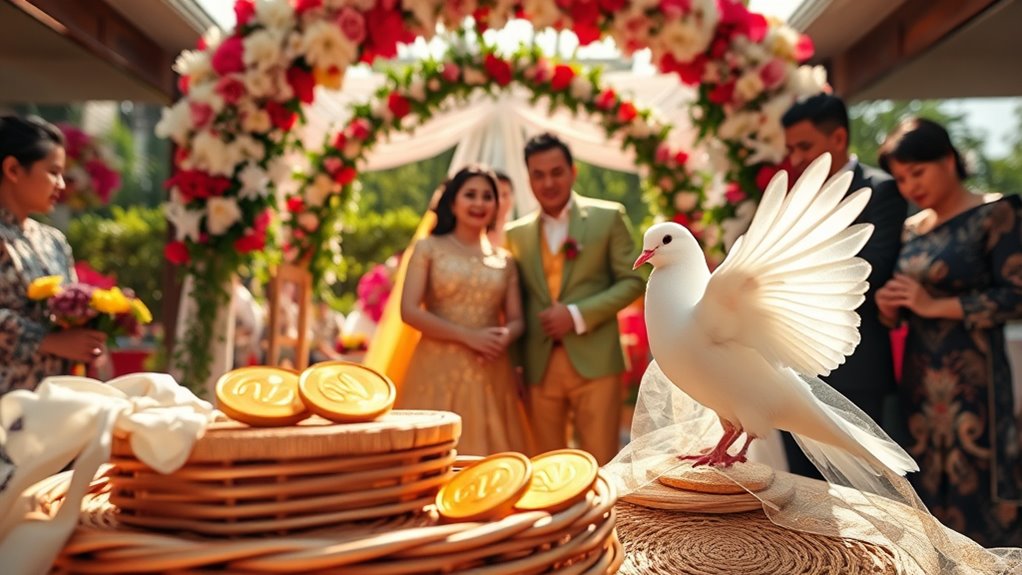
While planning a Filipino wedding, couples often engage in traditional rituals that not only celebrate their love but also lay the foundation for a successful marriage.
You’ll begin with pamamanhikan, where the groom seeks the bride’s family’s blessing. Choosing ninongs and ninangs as godparents serves to provide guidance in your journey together.
The ceremonial rituals—like the veil and cord and arrhae ceremony—symbolize unity and commitment. During the ceremony, you’ll exchange rings and light a unity candle, signifying the joining of families.
Wearing traditional attire, such as the barong Tagalog and filipiniana, reflects cultural heritage. These rituals create a supportive environment, ensuring that your marriage is blessed and grounded in rich traditions.
The Interplay of Religion and Culture in Weddings
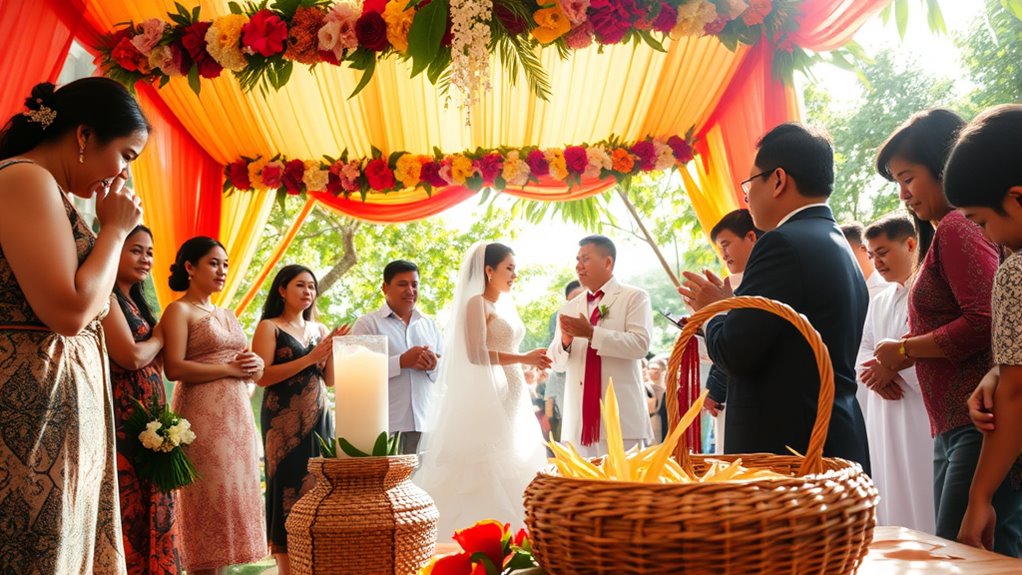
As you plan your wedding, you’ll find that religion and culture intertwine seamlessly, shaping the rituals and traditions you’ll embrace.
In Filipino weddings, superstitions reflect deep cultural beliefs, invoking good fortune for your future. Practices like avoiding certain colors and specific days highlight caution against misfortune, while local folklore adds richness to your ceremony.
Religion, particularly Catholicism, greatly influences wedding traditions, with prayers and rituals symbolizing the sanctity of your union.
Family involvement in superstitions fosters community and support, as elders pass down wisdom, ensuring cultural continuity.
While many couples blend modern elements with traditional practices, the essence of these customs remains, balancing respect for heritage with personal expression, enhancing both your wedding experience and familial bonds.
Frequently Asked Questions
Can We Break Any Superstitions if We Don’t Believe in Them?
Absolutely, you can break superstitions if you don’t believe in them.
Your wedding should reflect your values and beliefs, not outdated traditions. Ignoring superstitions often leads to empowerment, allowing you to create a ceremony that truly represents you as a couple.
Many thrive despite not following these practices, proving that love and mutual respect matter more than any superstition. Trust your instincts, and focus on what feels right for you both.
What Are Common Filipino Wedding Gifts Considered Lucky?
When it comes to Filipino weddings, you’ll want to hit the nail on the head with your gift choices.
Common lucky gifts include traditional items like the arras, symbolizing shared prosperity, and personalized keepsakes that showcase the couple’s journey.
High-quality kitchen appliances or decorative home essentials also make great gifts, blending practicality with thoughtfulness.
A touch of cultural heritage, like handwoven textiles, adds a special flair that resonates deeply with the couple.
How Do Weather Conditions Affect Wedding Planning?
Weather conditions can greatly affect your wedding planning. You’ll want to take into account the location and seasonal risks, as unexpected storms or extreme heat can disrupt your ceremony.
It’s vital to have a flexible venue and a solid backup plan, like an indoor space or tent. Regularly monitoring weather forecasts allows you to make timely adjustments, while keeping your guests informed about potential changes guarantees everyone’s prepared for whatever the weather brings.
Are There Specific Rituals for a Second Marriage?
Yes, there are specific rituals for a second marriage. You might consider wearing a different colored dress, as it’s believed to bring good luck.
A “cleansing” ceremony can also be performed to symbolize a fresh start. Consulting with elders for blessings and making offerings to family may help gain their support.
Additionally, incorporating moments to honor past relationships can create a meaningful connection to your journey and foster unity in your new beginning.
What Should We Do if It Rains on Our Wedding Day?
What if rain falls on your wedding day? Instead of worrying, embrace the moment!
Rain symbolizes good luck and prosperity, so consider it a blessing. Have an indoor backup plan ready and provide umbrellas for guests.
You can even incorporate rain-themed elements to celebrate the weather. Remember, it’s all about the love you share.
Focus on joy, and let the rain remind you to stand united against any challenges that come your way.
Conclusion
As you plan your Filipino wedding, remember that each superstition holds a deeper meaning, shaping your big day in ways you might not expect. Will the groom’s timely arrival bring blessings, or will weather omens test your resolve? Every detail, from symbolic offerings to the release of doves, weaves a story of love and tradition. So, as you embrace these customs, ask yourself: what secrets lie in these rituals, waiting to unfold on your special day?
